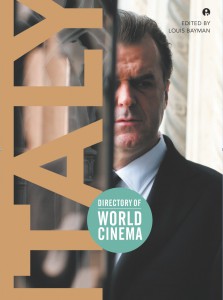Directory of World Cinema: Italy
Edited by Louis Bayman (Intellect, 2011). 280 pages. ISBN 978-1841504001 (paperback), £15.95; ISBN 978-1841505350 (ebook), £6.
 About the Author: Sarah Forgacs is a Doctoral candidate in Film Studies at King’s College London. Her thesis is entitled ‘Filming in the feminine: Varda, Denis, Breillat & Ozon’; her wider research interests include French cinema of the New Wave and contemporary periods, feminist film theory, intersections between film and philosophy and the recent work of Laura U. Marks on film and haptics. Recent publications include Several entries in Directory of World Cinema: France (Tim Palmer & Charlie Michael eds: Intellect Press, forthcoming 2012)
About the Author: Sarah Forgacs is a Doctoral candidate in Film Studies at King’s College London. Her thesis is entitled ‘Filming in the feminine: Varda, Denis, Breillat & Ozon’; her wider research interests include French cinema of the New Wave and contemporary periods, feminist film theory, intersections between film and philosophy and the recent work of Laura U. Marks on film and haptics. Recent publications include Several entries in Directory of World Cinema: France (Tim Palmer & Charlie Michael eds: Intellect Press, forthcoming 2012)
Email: sarah.forgacs@kcl.ac.uk
 Any attempt to compile a directory of Italian cinema within some 280 pages is a huge and unenviable feat. While scholars such as Mary Wood, Peter Bondanella and Millicent Marcus have attempted to chart the history of Italian cinema, most histories view the emergence of the Neo-Realism period and the release of Roberto Rossellini’s Roma Citta Aperta/ Rome, Open City in 1945 as the starting point and focus on works by the well-known auteurs such as Rossellini, Visconti, Antonioni and the like. This Directory is the latest in the Intellect Directory Of World Cinema series and seeks to broaden the conception of Italian cinema beyond neo realism, melodrama and horror.
Any attempt to compile a directory of Italian cinema within some 280 pages is a huge and unenviable feat. While scholars such as Mary Wood, Peter Bondanella and Millicent Marcus have attempted to chart the history of Italian cinema, most histories view the emergence of the Neo-Realism period and the release of Roberto Rossellini’s Roma Citta Aperta/ Rome, Open City in 1945 as the starting point and focus on works by the well-known auteurs such as Rossellini, Visconti, Antonioni and the like. This Directory is the latest in the Intellect Directory Of World Cinema series and seeks to broaden the conception of Italian cinema beyond neo realism, melodrama and horror.
In his Introduction, Louis Bayman poses three important questions;
- Is the more accurate image of Italian cinema one of political commitment and modernist masterworks, or the traditions of comedy and melodrama?
- Can Italian cinema principally be characterized as a socially-engaged cinema of documentary realism, or by the operatics of excessive theatricality?”
- Is its true heritage the prestige cinema of directorial genius or the popular cinema of genres and filoni (strands), the ‘cycles’ of formulaic, highly popular, low-budget productions whose brief life-spans of intense exploitation each led to total eclipse as fashions changed?
With following sections that return to the Silent Cinema of 1900s and conclude with a section on contemporary cinema, this Directory attempts to challenge the tendency of existing scholarship to focus on the heyday of Italian cinema’s post-war period. Bringing together contributions from some of the leading scholars on Italian cinema (namely Richard Dyer, Danielle Hipkins and Catherine O’ Rawe), alongside newer scholars who have either recently completed theses on Italian cinema (Alex Marlow-Mann and Sergio Rigoletto) or who maintain an interest in Italian cinema.
 Learning on Screen
Learning on Screen